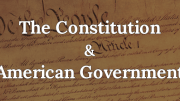In Part 1 of our “Reclaiming Power” series, we discussed the broader concept of government weaponization and how it conflicts with the Constitutional principles of separation of powers and checks and balances. Building on that foundation, we now focus on the Department of Justice (DOJ) and its role in upholding—or undermining—the rule of law. However, recent actions have raised concerns that the DOJ is drifting from its Constitutional mandate, particularly regarding infringing on the Bill of Rights and the bedrock principle of “innocent until proven guilty.”
Introduction
The United States Constitution stands as a beacon of justice and fairness, designed to protect the rights of all citizens and ensure that government power is wielded responsibly. Among the key pillars of this framework are the principles of equal protection under the law and the impartial administration of justice. These principles are enshrined in the Constitution to prevent the misuse of government authority. However, in recent years, concerns have been raised about the Department of Justice (DOJ) and its alleged “weaponization” to serve political ends. This blog post will explore how the DOJ’s perceived shift away from impartiality threatens the rule of law, the foundational principles of the Constitution, and why reclaiming power back to the people is essential.
The Role of the DOJ in the Constitutional Framework
The DOJ’s primary mandate is to enforce the law impartially, ensuring that justice is administered relatively across the nation. The Constitution grants the executive branch, within which the DOJ operates, the power to execute laws passed by Congress. However, this power comes with significant responsibilities, including the obligation to uphold the rule of law and protect the rights of all citizens without bias or favoritism.
The Constitution’s framers were deeply concerned about the potential for government overreach. They designed a system of checks and balances to prevent any one branch of government from becoming too powerful. The judiciary, insulated from political influence, was established to ensure that laws are interpreted and applied fairly. As the federal government’s law enforcement arm, the DOJ plays a critical role in this system by upholding the law without regard to political considerations.
DOJ Weaponization: A Threat to Equal Protection
The principle of equal protection under the law is a cornerstone of the Constitution, enshrined in the Fourteenth Amendment. This principle demands that all individuals be treated equally under the law, without discrimination or bias. However, when the DOJ is perceived as being “weaponized” to target specific individuals or groups based on political affiliation or ideology, this principle is severely undermined.
One of the most prominent examples of this perceived weaponization is the case of Michael Flynn, a former National Security Advisor. Flynn was charged with lying to the FBI during an investigation into Russian interference in the 2016 election. However, the circumstances surrounding his case, including allegations of entrapment by the FBI, led many to believe that his prosecution was politically motivated. The case symbolized the DOJ’s potential to be used as a tool for political retribution rather than a neutral law enforcer.
Similarly, the Roger Stonesentencing controversy highlighted concerns about the unequal application of the law. Stone, a longtime ally of former President Trump, was convicted of witness tampering and lying to Congress. The DOJ’s initial recommendation of a lengthy prison sentence was viewed by many as disproportionately harsh, leading to accusations that the department was targeting Stone for political reasons. The subsequent revision of the sentencing recommendation only fueled these concerns, suggesting that the DOJ’s actions were influenced by political considerations rather than the pursuit of justice.
The Erosion of the Presumption of Innocence
The presumption of innocence until proven guilty is a fundamental principle of the American legal system. It is a safeguard enshrined in the Fifth and Sixth Amendments of the Constitution, designed to protect individuals from unjust prosecution and ensure that everyone receives a fair trial. However, recent actions by the DOJ have raised concerns that this principle is being eroded.
For instance, the DOJ’s handling of the Hunter Bideninvestigation into tax issues and foreign business dealings has been criticized for its apparent lack of urgency and transparency. Critics argue that the DOJ’s perceived leniency towards Biden, the son of the sitting President, suggests that political connections may influence the administration of justice. This perception undermines public trust in the DOJ and raises questions about whether all individuals are treated equally under the law.
The FBI raid on Project Veritas, a conservative investigative journalism organization, is another example of the DOJ’s actions sparked controversy. The raid, conducted in connection with the alleged theft of a diary belonging to President Biden’s daughter, was widely criticized as an overreach that threatened First Amendment protections. The raid fueled concerns that the DOJ was being used to silence critics and suppress information that could damage the administration.
The ongoing imprisonment of many J6 individuals involved in the January 6th Capitol events without trial has further exacerbated concerns about the DOJ’s adherence to Constitutional principles. Despite the passage of over two years since the incident, a significant number of these individuals remain incarcerated without having been afforded their right to a fair and speedy trial, as guaranteed by the Sixth Amendment. The prolonged detention of these defendants, some of whom have been held in solitary confinement, raises serious questions about the erosion of due process and the presumption of innocence. This situation highlights the dangers of allowing political considerations to influence the administration of justice. It underscores the urgent need for the DOJ to return to its foundational role as an impartial law enforcer.
Reclaiming Power: Restoring Constitutional Order
The Constitution was designed to prevent the concentration of power in any one government branch and protect individual liberties from government overreach. However, when the DOJ is perceived as acting outside of its Constitutional mandate, it threatens these protections and undermines the rule of law. To reclaim power and restore trust in the DOJ, it is essential to ensure that the department operates strictly within its Constitutional boundaries.
First and foremost, transparency and accountability must be prioritized within the DOJ. The public has a right to know how and why decisions are made, especially when those decisions have significant political implications. The DOJ can rebuild public trust and demonstrate its commitment to impartial justice by increasing transparency.
Second, the DOJ must be held accountable to the principle of equal protection under the law. This means the justice system must treat all individuals fairly and equally, regardless of their political affiliations or connections. Any perception of bias or favoritism must be addressed swiftly and decisively to prevent the erosion of public confidence in the DOJ.
Finally, it is crucial to reinforce the separation of powers and the system of checks and balances that are foundational to the Constitution. Congress and the judiciary must exercise their oversight responsibilities to ensure that the DOJ remains a neutral enforcer of the law, not a tool for political agendas.
Conclusion
The Department of Justice plays a critical role in upholding the rule of law and protecting the rights of all Americans. However, when the DOJ is perceived as being “weaponized” for political purposes, it undermines the principles of equal protection and the presumption of innocence that are essential to the Constitution. To reclaim power and restore the integrity of our legal system, the DOJ must operate transparently, impartially, and within the limits set by the Constitution.
In the next part of this series, we will examine the Federal Bureau of Investigation (FBI) and how its actions have raised concerns about due process and the potential for government overreach. Stay tuned as we explore how reclaiming power is vital to preserving our Constitutional freedoms.
Read the Reclaiming Power Series:
- Reclaiming Power: DOJ Weaponization and the Rule of Law
- Reclaiming Power: FBI Weaponization and Due Process
- Reclaiming Power: IRS Weaponization and Equal Protection
- Reclaiming Power: EPA Weaponization and Property Rights
- Reclaiming Power: DHS Weaponization and Individual Liberties




